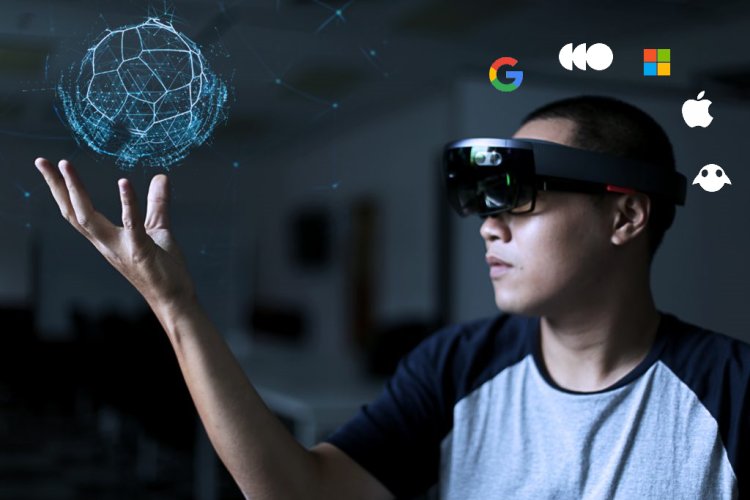Here are 5 companies Building the Virtual Reality Future
The tech giant, which changed its name to Meta last month, plans to invest $10 billion this year to develop products that support augmented and virtual reality, including robotic arms, advanced virtual reality glasses and sophisticated software applications. a few. Analysts expect the company to spend at least $50 billion to fulfill its promises to the future of virtual reality.

According to Facebook, the future is a virtual reality "metaverse".
The tech giant, which changed its name to Meta last month, plans to invest $10 billion this year to develop products that support augmented and virtual reality, including robotic arms, advanced virtual reality glasses and sophisticated software applications. a few. Analysts expect the company to spend at least $50 billion to fulfill its promises to the future of virtual reality.
But the meta isn't the only player. In fact, six other companies are already building the hardware and software that will be the next generation of virtual interactions. Wall Street is a market that we see as a trillion dollar market. Companies include Google, Microsoft, Apple, Valve, and other companies that make products for work and communications. As investors flood the market, small startups are likely to join.
Google Cardboard could be the most successful VR project in history. In 2014, the then-largest tech company asked millions of people to stick their smartphones to their faces with cardboard. Google says it has shipped "tens of millions" of foldable headsets and that the Google Cardboard app has been downloaded more than 160 million times. Although not a high-definition or high-tech experience, this strategy has helped millions of students and aspiring developers experience virtual reality. Google abandon its previous augmented reality experiment, Glass.
Today, augmented reality glasses are marketed as an enterprise tool, but when they launched, Google's expectations were skyrocketing. Literally: The $1,500 product was announced by Google founder Sergei Brin when he jumped out of a plane.
Glass is basically the inside of a smartphone with a small camera mounted on the rim of regular glasses. The project failed, but it failed before numerous memes were generated.
Microsoft
Microsoft announced the Hololens mixed reality glasses in 2015. Rather than flooding the consumer market with marketing hype, Microsoft quietly launched Hololens a year later as a manufacturing tool targeting a curated group of companies. A $3,000 commercial package that comes with Windows Professional with additional security features and software to help you develop applications. The second version debuted in 2019 and was slightly more expensive, but used a better camera and lens mount for more accurate performance, and offered a wider range of software features, including industrial applications.
Current Hololens users include heavyweights like Kenworth, Suntory and Toyota, who use headsets to speed up learning and car repairs, according to Microsoft.
Apple
If the rumors are true, Apple has been on the verge of launching AR glasses for years. The iPhone maker launched ARKit in 2017, a developer platform for building augmented reality apps for Apple devices with iOS 11. According to tech site The Information, Apple held a 1,000-person conference in 2019 to discuss AR on the iPhone and two potential future products. , N421 smart glasses and N301 VR headset. Analysts now speculate that Apple is preparing to launch AR products after 2022.
Valve
The Valve Index headset is the most trusted consumer virtual reality product on the market. The high-resolution screen is smooth and the controller provides unmatched control in virtual reality and gaming environments. This index is also integrated with the Steam video game marketplace Value. This means you already have compatible content on your device.
Besides, expensive and clumsy. A full Index VR kit costs almost $1,000 and requires multiple cables and sensors for the headset to work properly. Valve continues to innovate and experiment with immersive virtual reality headsets. Analysts expect the Bellevue-based gaming company to soon launch a standalone headset that will compete with Facebook's Oculus Quest 2.
Magic Leap
While the idea for virtual reality is partly inspired by science fiction, Big Tech's modern vision of the future of AR and VR is directly inspired by Magic Leap. Founded in 2010, the company raised more than $500 million in 2014 from companies like Google and chip maker Qualcomm. In 2015, the company released a stunning video, known to showcase the technology of its products. However, skeptics questioned the technology and the final product was criticized. The first Magic Leap headset was sold in collaborative creative industries such as design and advertising.
Magic Leap launched an enhanced AR device in 2018, has raised more funding, and plans to release Magic Leap 2 in early 2022. The company also plans to target defense, medical and manufacturing.







